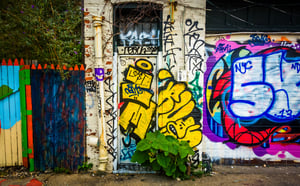
Tips and Tricks: Protecting Your Dealership from Vandalism
Not all Halloween tricks are harmless fun. October often brings a spike in vandalism, especially around Halloween, with pranks and mischief leading to costly damage. For automobile dealerships, vandalism is a year-round concern that can disrupt operations and hurt profitability. Preventing these incidents and addressing their financial consequences is critical for dealership owners.
PARTNER SPOTLIGHT
Dealer Management System, Computer Technology, Media/Advertising, Automotive Auction, F & I/Aftermarket Products, Automotive Technology Training & Compliance
 A NHADA Gold PARTNER
A NHADA Gold PARTNERComputer Technology, Automotive Shop Equipment, Environmental Services
 A NHADA Platinum PARTNER
A NHADA Platinum PARTNERF & I/Aftermarket Products, Automotive Technology Training & Compliance, Environmental Services
.png?width=150&name=corp_logo_horz_on_light_with_trademark_symbol_1200w%20(002).png) A NHADA Diamond PARTNER
A NHADA Diamond PARTNERFinancial Risks
Dealerships that don’t manage vandalism risks effectively may struggle with the negative financial ramifications. Vandalized inventory can require costly work before it can be sold. Graffiti or broken windows diminish a dealership's appearance and impact its professional image. Frequent vandalism claims can raise insurance premiums and may lead to denied coverage. Additionally, vandalism creates liability risks, especially with customer vehicles. Cars vandalized while at the dealership for service can result in legal disputes and strained client relationships. Safeguarding both dealership and customer property is essential to avoiding lawsuits and extra costs and maintaining a positive reputation.
Preventing Vandalism
To effectively mitigate the risk of vandalism, dealerships can implement a range of security measures designed to deter potential criminals and protect both their inventory and facilities, including:
- Surveillance Systems: Installing quality cameras covering all areas acts as both a deterrent and a tool to identify vandals.
- Physical Barriers: Fencing, gates, and restricted access points make it harder for vandals to enter, especially after hours.
- Lighting: Bright, motion-activated lighting deters vandals who prefer to operate in the dark.
- Security Personnel: On-site or remote monitoring provides additional protection. Visible security measures discourage criminal activity.
While these security measures may require a substantial upfront investment, the long-term benefits far outweigh the costs, as reducing the likelihood of vandalism is significantly less expensive than repeatedly repairing damaged inventory and facilities.
Insurance Coverage
When vandalism does occur, it calls for prompt action. Dealerships must immediately notify affected customers, provide transparent information about the damage, and outline repair options. That makes comprehensive insurance coverage essential. While Vandalism and Malicious Mischief (VMM) insurance typically covers intentional property damage, dealerships must ensure protection extends to both facilities and vehicles. Commercial property policies often include vandalism coverage, but business owners should verify their specific terms. For customer vehicles, garage keepers' liability insurance protects businesses like auto dealerships from financial losses by covering damages to customer vehicles while they are in the dealership’s care.
Selling Vandalized Vehicles
Vandalism can result in a range of damage, from minor cosmetic issues to severe harm, requiring dealerships to carefully follow repair and sale processes to ensure compliance with New Hampshire state regulations. Here are the specific requirements for Maine, Massachusetts, New Hampshire, and Vermont for those of you who have multiple dealerships:
- Maine: Dealerships must follow strict disclosure laws, requiring sellers to inform buyers of any significant damage, including vandalism. If a vehicle has been damaged to the point where repairs cost 75% or more of its pre-damage value, it is classified as a salvage vehicle under Maine law. Dealerships are required to disclose this status to potential buyers and ensure that salvage vehicles are repaired and pass a state inspection before being sold. All vehicles, including those with prior vandalism, must be roadworthy and meet safety standards before being offered for sale.
- Massachusetts: Dealerships in Massachusetts must comply with the state's Lemon Law. If a vehicle has been vandalized, defects caused by the vandalism may not be covered if they don’t impact the vehicle’s basic operation or safety. Massachusetts consumer protection law also prohibits the sale of vehicles "as-is," meaning even vandalized vehicles must meet operational and safety standards before being sold. Dealerships are obligated to repair any defects that impair safety or use.
- New Hampshire: Dealerships are required to disclose any material defects, including damage from vandalism, to potential buyers. Under New Hampshire law, if a vehicle is deemed "salvage"—meaning it has been damaged to the extent that the cost of repairs exceeds 75% of its market value—it must be labeled as such. Salvage vehicles cannot be sold until they have been properly repaired and passed a salvage inspection. Additionally, "as-is" sales are generally prohibited for most vehicles, meaning the vehicle must be in safe, working condition and meet all operational standards before being sold.
- Vermont: Dealerships in Vermont must comply with strict consumer protection laws, requiring full disclosure of a vehicle’s condition, including any damage from vandalism. If a vehicle has been significantly damaged and the cost of repairs exceeds 75% of its pre-damage value, it is classified as a salvage vehicle and must be issued a salvage title. The vehicle cannot be sold until it is properly repaired and passes a state salvage inspection. Additionally, under Vermont’s Lemon Law, dealerships must ensure that all vehicles, including those previously vandalized, meet safety and operational standards before sale.
Failure to follow these regulations in any of these states can lead to legal action, including the buyer seeking arbitration or court remedies.
You’re Not in This Alone
Vandalism is often not confined to one business—it is a community-wide issue. Promoting a sense of mutual responsibility through strong relationships with the local community helps prevent vandalism. Dealership owners should participate in business networks and crime prevention programs to share information on suspicious activity. Neighbors and nearby businesses can work together to monitor potential threats. If vandalism occurs, quick coordination with law enforcement and the community is key. Surveillance footage or eyewitness reports from nearby businesses can assist in identifying suspects. A united effort improves the likelihood of resolving the issue and holding vandals accountable.
By looking out for each other, local businesses can reduce risk and create a safer environment where everyone is better positioned to thrive.
The Road Ahead
For automobile dealerships, vandalism presents financial, legal, and reputational risks. Investing in strong security measures, maintaining comprehensive insurance coverage, and building community relationships are key steps in reducing these risks. By taking a proactive approach, dealerships can protect their assets, preserve their reputation, and ensure long-term profitability. Consult with an ARB Dealership Services Advisor or your insurance advisor to make sure your business is properly protected this Halloween and throughout the year.
Author: Barton Haag, CPA
A Note From NHADA: Some of our partners can offer assistance to assure your business is safe, including:
- Cross Insurance, NHADA Bronze Partner
- Zurich, NHADA Bronze Partner



















.png?width=150&name=Ally_Final%20Logos%20and%20Pairings_11.14.2018-01%20(2).png)


-2.png?width=150&name=Wipfli%20Logo%20Blue%20RGB%20(1)-2.png)


.jpg?width=150&name=NHADA_Partner_FTR_Img_NHADA_Insurance%20(1).jpg)


.jpg?width=150&name=NHADA_Partner_FTR_Img_JMA(1).jpg)

